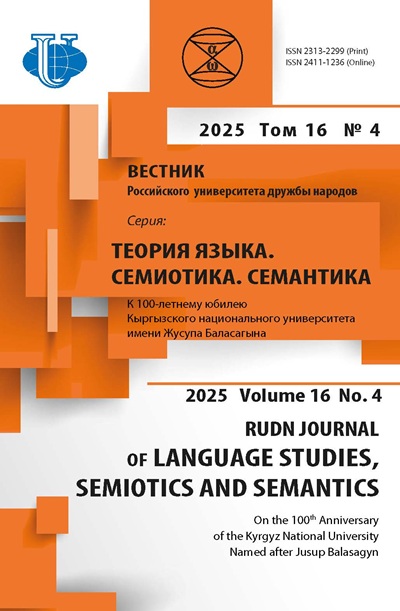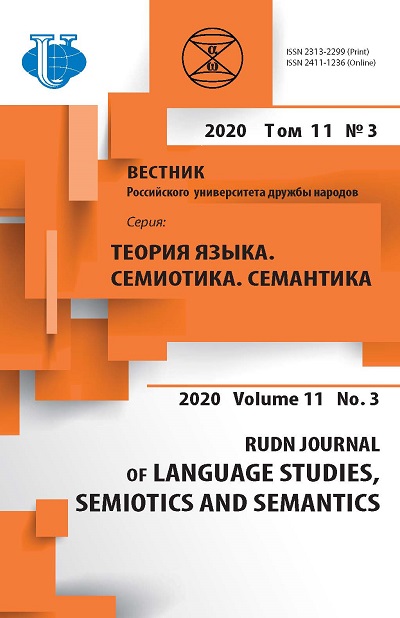Infinitive Interrogative Sentences in Russian and Persian: Modal Meanings of Potentiality and Efficiency
- Authors: Hoseini A.A.1, Kahnamouei T.K.1
-
Affiliations:
- Tehran University
- Issue: Vol 11, No 3 (2020)
- Pages: 585-595
- Section: FUNCTIONAL GRAMMAR
- URL: https://journals.rudn.ru/semiotics-semantics/article/view/24608
- DOI: https://doi.org/10.22363/2313-2299-2020-11-3-585-595
- ID: 24608
Cite item
Full Text
Abstract
The article is a study of infinitive interrogative sentences bearing meanings of potentiality and efficiency in Russian and the means to render those in Persian. Both for Russian and Persian, such interrogative syntactic constructions and the relevant range of meanings are typical. As is known, in Russian infinitive is a verbal form though in a sentence it can combine the noun-and-verb functions, while in Persian, infinitive functions as a noun. As a rule, so-called Russian ‘indefinite verbal form’ reflects various subjective and objective modal meanings, in particular, those of potentiality and efficiency which differs in Persian rather to reflect modal meanings of desirability, possibility, necessity, the must, inevitability, doubt, motive, etc. In relevant contexts the combination of modal meanings of desirability and possibility forms the potentiality meaning which is expressed by various linguistic means to form sentences: intonation, lexical and grammatical units, semantical components; other contexts of using such linguistic means to combine modal meanings of desirability and motive reveal the meaning of efficiency. The meanings themselves are not characteristic of Persian infinitive primarily due to their grammatical properties and belong to nouns therefore in Persian the mentioned above meanings and senses could be reflected by other linguistic means as well. The task of the study is to tackle the question of what are the means and manner they might make linguistic analogy to transmit semantics of potentiality and efficiency in Persian, while they are expressed in Russian infinitive interrogative sentences and rhetorical questions.The article treats infinitive interrogative sentences and rhetorical questions with infinitive as a predicate to render the semantics of potentiality and efficiency on the drama texts by M.Yu. Lermontov and A.P. Chekhov and the epic novel by A.N. Tolstoy. In course of comparative study, the translations into Persian of those texts were involved to find out similarities and differences of linguistic means used to reflect and reveal the semantics of infinitive interrogative sentences.
About the authors
Amir Aliasghar Hoseini
Tehran University
Author for correspondence.
Email: amhoseini@ut.ac.ir
Associate professor in Department of Russian language and literature
15/16, North Kargar Street, Tehran, Iran, 1417466191Tabassom Khakrah Kahnamouei
Tehran University
Email: t.khakrah@gmail.com
Phd student of the Department of Russian language and literature
15/16, North Kargar Street, Tehran, Iran, 1417466191References
- Sheliakin, M.A. (2011). Russian infinitive: morphology and functions. Moscow: Flinta-Nauka. (In Russ.).
- Babaytseva, V.V. (2015). Russian syntax. Moscow: Flinta. (In Russ.).
- Modern Russian language: Part 2 (2008). Y.I. Dibrova (Ed.) Moscow: Pblishing center “Academy”. (In Russ.).
- Modern Russian language: Syntax of word-combination & simple sentence (2008). N.M. Pipchenko (Ed.). Minsk: Belarussian State university. (In Russ.).
- Russian syntax (2015). A.A. Shakhmatov (Ed.). Moscow: Flinta. (In Russ.).
- Staradoomova, E.I. (2005). Syntax of Modern Russian language. Vladivastok: Far-Eastern Federal university. (In Russ.).
- Vaynova, E.I. (1981). Russian language textbook. Moscow: Russian language. (In Russ.).
- Skablikova, E.S.(2006). Russian language: Syntax of the simple sentence. Moscow: Nauka. (In Russ.).
- Bayramova, L.K. & Safioolina, F.S. (1989). Comparative syntax of Russian and Tatar languages. Kazan: Kazan Federal university. (In Russ.).
- Babaytseva, V.V. & Maksimov, L.U. (1987). Syntax. Рunctuation. Moscow: Prosveshhenie. (In Russ.).
- Karazina, V.I. (2007). Modern Russian language: structural organization of the simple sentence. Yelets: Yelets state university. (In Russ.).
- Syntax of modern Russian language (2009). G.N. Akimova, C.V. Viatkina & all (Eds.). St. Petersburg: Saint Petersburg State university. Moscow: Academy. (In Russ.).
- Mastovaya, L.A. (1999). Rhetorical question in groups of indirect speech acts. Russian language studies, 4, 39—45. (In Russ.).
- Shvedova, N.Yu. (1980). Russian grammar. Vol. 2. Moscow: Nauka. (In Russ.).
- Vinogradov, V.V. (1975). Studies in Russian grammar. Moscow: Nauka. (In Russ.).
- Zolatava, G.U. (1973). Essay on functional syntax. Moscow: Nauka. (In Russ.).
- Tekachenko, A.I. (2011). The text-forming role of modality in a article newspaper. Scientific notes of the Kazan University, 153, 286—291. (In Russ.).
- Hosseini, A. (2015). Infinitive sentences with the objective meaning of predetermination in Russian language and methods of their expression in Persian language. Young scientist, 2, 621—625. (In Russ.).
- Bondarko, A.B. (1990). Theory of Functional grammar: Temporality, Modality. St. Peterburg: Nauka. (In Russ.).
- Fedorava, I.R. (2000). The modality of possibility in Russian language (on the material of newspaper). Kaliningrad: University of Kaliningrad. (In Russ.).
- Zeleshnikova, A.V. (2010). Position and modality. Moscow: Librokam. (In Russ.).
- Anvary, H. & Ahmady Givy, H. (2011). Persian language grammar 2. Tehran: Fatemi Publishing. (In Iranian).
- Farshidvard, Kh. (2003). Detailed modern grammar based on the new libguistic. Tehran: Sokhan publication. (In Iranian).
- Valizadeh, Kh. & Hosseini, A. (2015). Infinitive sentences with the meaning of Subjective predetermination in the Russian language through the prism of Persian language. Philological sciences. Theoretical & practical problems, 9, 57—61 (In Russ.).
- Hosseini, A. (2002). Investigating the grammatically syntactic features of infinitive in Russian language in comparison with the Persian language. The journal of foreign language and literature of university of Tehran, 12, 19—32. (In Iranian).
- Shafahi, A. (1984). Scientific principles of Persian grammar. Tehran: Novin publication. (In Iranian).
- Tayebniapour, F. & Valipour, A. (2014). Methods of expressing modal meaning of possibility in Persian language. Litera, 2, 129—143. (In Russ.).
- Rubinchik, Yu.A. (2001). The grammar of modern Persian literature. Moscow: “Eastern literature” RAN. (In Russ.).
- Arjang, (1994). A. The modern Persian grammar. Tehran: Ghatre publishing. (In Iranian).
- Meshkatod Dini, M. (1985). Persian grammar: Based on the Transformational grammar. Mashhad: Ferdowsi university of Mashhad. (In Russ.).
Supplementary files












